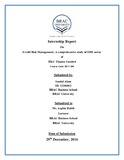| dc.description.abstract | Financial sector of any country plays a critical role in transmitting monetary policy impulses to the entire economic system. Financing is a business based on risk. However, it is basic to manage and minimize that hazard. The paper will describe about some basic issues required in dealing with those dangers with unique concentrate on the loaning or credit risk of SME (Small and Medium Enterprise) financing in Bangladesh.
Risk is the component of vulnerability or probability of misfortune that prevail in any business exchange, in any mode or time. In the monetary field, undertaking risks can be extensively sorted as Credit Risk, Operational Risk, Market Risk and Other Risk. Credit risk is the likelihood that a borrower or counter gathering will neglect to meet concurred commitments. All around, more than half of aggregate risk components in banks and FIs are Credit Risk alone. Along these lines overseeing credit risk for proficient administration of a Financial Institution has slowly turned into the most significant errand. Credit risk administration in SME includes identification, estimation, coordinating alleviations, observing and control of the credit risks.
Small and Medium Enterprise (SME) assumes a crucial part in the monetary development and improvement of a nation. SME fills in as the stage for job creation, wage era, improvement of forward and in reverse mechanical linkages and satisfaction of nearby social needs. SMEs possess a one of a kind position in the economy of Bangladesh. For the most part private segment improvement relies on upon them.
The research findings of “National Private Sector Survey of Enterprises in Bangladesh” (a study conducted by USAID, DFID and CIDA) indicates that SMEs contribute to the extent of 25% of the GDP in Bangladesh, about 40% of the Gross Manufacturing Output, 80% of Industrial Jobs and around 25% of the total Labor Force and the total number of SME Entrepreneur is about 06 Million. Among other findings, the study concludes that SME sector is significantly a rapid growth oriented sector to flourish in Bangladesh.
SMEs are an exceptionally heterogeneous group in Bangladesh, containing a wide assortment of firms of handicraft creators, small machine shops, eateries, printing, bicycle rickshaw assembly, cartwheels, electrical merchandise, designing workshops, footwear, plastic items, plastic display outlines, print shops, silk weaving, fitting shops possessed by ladies, building material supply, nourishment arrangement, small supermarkets, squander paper accumulation, and so forth. Along with that a part of readymade pieces of clothing endeavors additionally falls under SME division.
The report has two principle parts to be specific hierarchical part and research part. In the association part, IDLC's administration, operation and execution have been highlighted. The examination part of the report has been partitioned into two areas. The primary segment comprises of an investigating rule, which has been created for the best possible execution of SME Managing an account in Bangladesh. In the second part, unique operational part of SME Saving money directed by the concerned association has been depicted.
In the research portion of the report, a policy and strategy guideline for the proper execution of SME banking has been given for review. The Financial Institutions who are intended to commence the SME operation can use this guideline. At the later part of the report, the description of the Retail SME product and in-depth credit risk management procedure of IDLC has been discussed. | en_US |

